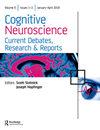在神经生物学中奠定语言的计算原理需要跨模态和跨语言的数据。
IF 2.2
4区 医学
Q3 NEUROSCIENCES
引用次数: 0
摘要
Murphy对他最近的ROSE模型的讨论(2025)包括明确的连接假设,将语言研究及其神经生物学基础中的计算、算法和实现层面联系起来。在这里,我认为建立自然语言语法抽象原则的神经基础将需要来自手语、触觉手语以及不同类型的口语的新数据。结构构建的模态独立过程的假设是ROSE的核心,但提出的分层和顺序操作的相关性必须在未来进行跨语言和模态的经验检验。本文章由计算机程序翻译,如有差异,请以英文原文为准。
Grounding the computational principles of language in neurobiology requires cross-modal and cross-linguistic data.
Murphy's discussion (2025) of his recent ROSE model includes explicit linking hypotheses connecting computational, algorithmic, and implementational levels in the study of language and its neurobiological basis. Here, I argue that establishing the neural basis of the abstract principles underlying natural language syntax will require new data from sign languages, tactile sign languages, as well as typologically diverse spoken languages. The assumption of modality-independent processes for structure building lies at the heart of ROSE, but the proposed correlates for hierarchical and sequential operations must be subjected to empirical test across languages and modalities in the future.
求助全文
通过发布文献求助,成功后即可免费获取论文全文。
去求助
来源期刊

Cognitive Neuroscience
NEUROSCIENCES-
CiteScore
3.60
自引率
0.00%
发文量
27
审稿时长
>12 weeks
期刊介绍:
Cognitive Neuroscience publishes high quality discussion papers and empirical papers on any topic in the field of cognitive neuroscience including perception, attention, memory, language, action, social cognition, and executive function. The journal covers findings based on a variety of techniques such as fMRI, ERPs, MEG, TMS, and focal lesion studies. Contributions that employ or discuss multiple techniques to shed light on the spatial-temporal brain mechanisms underlying a cognitive process are encouraged.
 求助内容:
求助内容: 应助结果提醒方式:
应助结果提醒方式:


